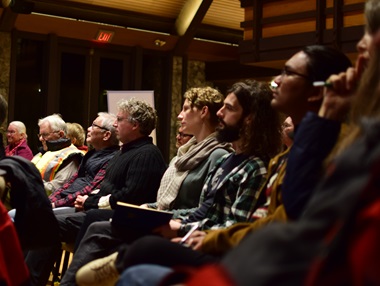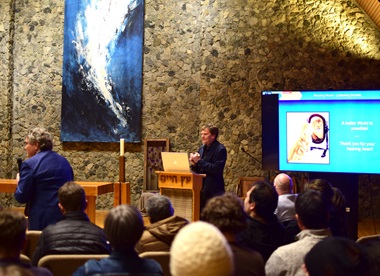
The audience for Dr. Hartmut Rosa at Epiphany Chapel. Photo: Vancouver School of Theology
If you were an alien watching our world over the past several centuries, what might you notice? Sociologist Hartmut Rosa thinks he can boil the answer down into one word: acceleration.
The most obvious example is the acceleration of human movement. Several hundred years ago, the vast majority of people would have lives and relationships limited to the distance they could walk or, possibly, ride. Over the centuries our modes of transportation have “advanced from canoes to galleys to steamships to space shuttles” as Yuval Harari says, drastically increasing our reach in the world.
It’s not abnormal that someone today could come from China to Vancouver for high school, do an undergrad at McGill, complete their degree at the London School of Economics and take their first job in Turkey.
But it’s not only our physical movement that is accelerating. Rosa points out that almost every area of modern life is characterized by acceleration: from information to relationships, from technology to finance.
But what has this acceleration meant for us? On one hand, the mobility of humans and ideas have yielded incredible good, expanding our cultural, relational and mental horizons. Without acceleration we likely wouldn’t know that there was a ‘fifth’ taste called umami, be blessed with friendships from Kenya and Brazil or have the shared ability to effectively treat forms of cancer.
However, Rosa wants to point out, there have also been huge downsides to this acceleration.
What happens when we ask our environment to ‘accelerate,’ taking on an ever-increasing load of processing carbon and pollution? We end up in our current ecological crisis. What happens when we apply the logic of acceleration to ourselves and our relationships, asking people to become more efficient, to take power naps, eat fast food, speed date, continually promote themselves online? We end up in a culture with deep relational alienation and epidemics of burnout and depression.

Hartmut Rosa delivered the Peter G. Kaye Lecture this year. Photo: Vancouver School of Theology
In the G. Peter Kaye lectures at Vancouver School of Theology (March 1 – 2), Rosa asked the question of acceleration in a specific direction: What happens when we live in an increasingly complex society, but we have less and less time to engage in the hard work of democracy?
For Rosa, the answer is the polarized world we currently inhabit. We don’t have the time to engage in the deep conversations about complex issues or to listen and consider the views of those who might have solutions that disagree with ours.
So we choose uninformed positions based on soundbites which don’t get in the way of our accelerating lives. We quickly strawman people or parties on the other side of the aisle, othering them to the point of dehumanization.
What, if anything, is the solution to this problem? For Rosa, one of the most important antidotes to the problems we face in modern society is to discipline ourselves to listen: to find time and spaces where we can truly be open to others in an unhurried way. To engage in the human longing to know and be known.
The good news is that Rosa thinks there is a space where we could re-learn this important practice of listening: the church. For Rosa, the church, at its best, is a people that live in a different vision of time (non-accelerated time) and are deeply committed to listening – to God and to each other.
For Rosa, Democracy Needs Religion (the title of his newest book).
But before we start handing out thousands of copies of Rosa’s book on Granville, I think we, as Christians, need to do some deep critical evaluation. Are our communities and gatherings times where we’re modelling and teaching listening? If you ask your average person on Granville what Christians are like, will they say “good listeners”? I think the answer is a pretty clear “No.”
That leads me to consider three things coming out of Rosa’s excellent lectures this past weekend: a set of questions, a challenge and a hope – in that order.
First, the questions: Why aren’t churches known for being a gymnasium of listening? Where have we, possibly unwittingly, committed ourselves to the logic of acceleration? Why have we responded to a perceived diminishing voice in Canada by grabbing a bigger bullhorn rather than listening? Why have we contributed to the polarization and alienation?

John Hau
Second, the challenge: How might we relearn the practice of listening that we seem to have lost somewhere along the way? What might be some practices of listening that we could institute into our gatherings and relationships that could help us become listeners and people of resonance? How might we recapture the ability to ‘waste time’ on each other, to learn to wait for the God who speaks and makes Himself known?
Finally, a hope: that Christians might gain a vision for and learn to become a new people, a listening people, who point to a God who both listens and speaks.
John Hau is lead pastor at Reality Church and the COO of Colours + Shapes, a multidisciplinary creative studio, both in East Vancouver.
